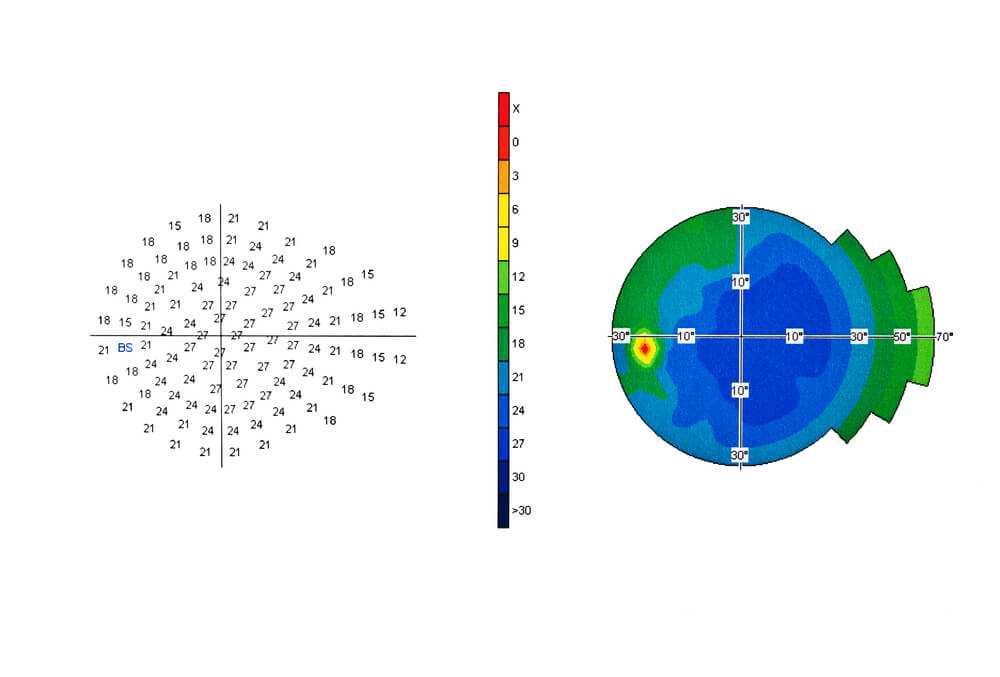While focusing on a specific point - such as the words in this article or the TV - you will notice that you can still see things out of the corners of your eyes, this is your peripheral vision and is crucial for spatial awareness and safety - you will still see if something or someone is coming towards you even if you are not looking. A visual field test allows your optometrist to measure how much peripheral vision you have and how much, if any, you have lost.
Why Is A Visual Field Test Important?
Visual field tests are a way to look at the health of your eyes and brain. They are used to detect early signs of eye conditions such as glaucoma, which can cause loss of vision if left untreated. They also allow the detection of optic nerve disease and even brain tumours.

Does A Visual Field Test The Peripheral Vision?
Yes a visual field test will test your peripheral vision but so much more, a typical test will check
Peripheral Vision - This checks how well you see to the sides when you are looking straight ahead. Reduced peripheral vision can be an indication of Glaucoma.
Central Vision - This tests how well you see directly in front of you. If any blind spots (scotomas) are present in the central vision this can indicate some central vision loss.
Overall Visual Field - This checks the entire area you can see, including the sides, top and bottom levels of your vision. Any abnormalities in these areas can indicate issues such as retinal problems or neurological conditions.
How Long Does A Visual Field Test Take?
A visual field test normally takes only about 10 - 15 minutes per eye. It's a pretty straight forward and non-invasive test.
Why Didn't I Have A Visual Field Test?
A visual field test is not necessarily carried out on everyone at every routine sight test, they are usually reserved if specific concerns are raised or risk factors are present.
During a regular eye test, your Optometrist will check your vision, your eye pressure and ask questions relating to your health and medication, if these tests highlight symptoms such as headaches, vision changes, or a family history of eye disease your Optometrist may recommend a visual field test.
Who Needs A Visual Field Test?
A visual field test is particularly helpful for people who are at risk of losing their vision due to eye disease or other conditions. This is one of the reasons your optometrist takes such a comprehensive medical history. Conditions that are most likely to indicate you require a field test include:
- Glaucoma, or suspected Glaucoma
- Multiple sclerosis
- Graves Disease
- Pituitary gland disorders
- Stroke
- Central nervous system problems
- Long-term usage of certain medications
- Neurological conditions
- Droopy eyelids
- Possible retinal detachment
- Optic nerve disorders
Can I Drive If I Failed A Visual Field Test?
If your visual field is compromised your ability to see and perceive things in your peripheral vision may affect your reactions to events outside your central vision. If you have significant visual field loss and do not meet the required standard you should not drive. You must inform the DVLA who will assess your ability to drive.
Conclusion
It is easy to take our vision for granted, however, our ability to see and perceive things all around us is an important part of how we react to situations, to lose part of that vision can alter how we feel, and how we interact with people and the world around us.
If you are concerned about vision loss or your ability to continue driving, talk with your optometrist or eye care professional.
Author: John Dreyer Optometrist Bsc(Hons), MCOPTOM, DipCLP
Created: 18 Oct 2024, Last modified: 7 Jan 2025

